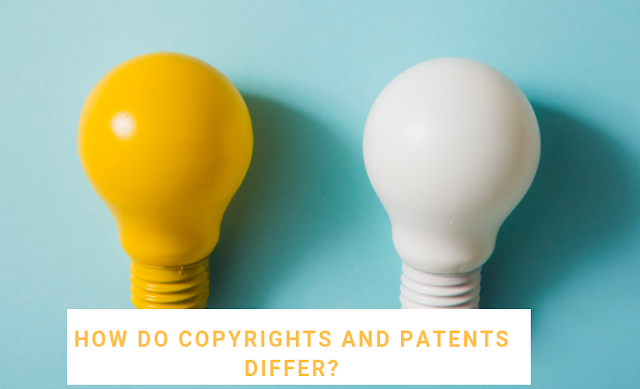What they cover
Copyrights cover “original works of authorship fixed in a tangible medium
of expression.” The word “authorship” might be misleading to a layperson,
insofar as it suggests strictly written works. It’s more general: audio, video,
dance choreography, sculpture, architectural works, and others are also
covered.
Patents cover… more specific things. They can cover concrete things, like
machines or chemicals. They can cover less tangible things, like methods of
doing stuff (like methods of manufacturing a machine or chemical). In some
cases they can have the practical effect of covering algorithms.
(That last sentence might be like nails on a chalkboard to some
patent-educated folks, because technically pure algorithms
aren’t patentable. I don’t think that discussion is illuminating in the context
of this basic, foundational question.)
How to get them
Getting a copyright is easy. As soon as the metaphorical pen leaves the
metaphorical paper, the author has rights. If you write a poem on a cocktail
napkin, you instantly hold the copyright on your poem. That’s true even if your
poem is identical to a poem someone else wrote. In other words, there’s no
“novelty” requirement for copyrights. It must only
be original, in the sense that you came up with it through your own
creative process.
It’s a lot harder to secure patent rights. You first draft a patent
application and send it to the patent office. That application is very closely
scrutinized and researched by a patent examiner. The patent examiner will determine
whether your invention is novel (and some other requirements).
Typically, the process takes many years to successfully navigate. It’s also
very costly. There are also filing fees with the patent office over the
lifetime of the application, typically amounting to a grand or two but possibly
more.
How long they last
A patent, if granted, lasts 20 years from the date the application was
filed.
A copyright lasts longer. How long depends on whether the author is a
person (or people), or if the work is a “work for hire” from a corporation.
If the author is a person or people, then the copyright lasts for 70
years after the death of the last living author. If it’s a
work for hire (or an anonymous or pseudonymous work), then it’s the shorter of
95 years from first publication, or 120 years from creation.
It’s actually a little more complicated than that, because
Congress had monkeyed around with the duration of copyrights. In practice,
there are different rules based on the date the work was created or first
published. But what I said above applies to works created today.
What they prevent
If I have a patent, I can stop anyone else from making, using, selling, or
offering to sell my patented invention.
If I have a copyright on my work, I can stop anyone else from copying,
distributing copies, and creating derivative works of my work. For those works
that can be publicly performed or displayed, I can stop others from public
performance or display.
Both of these categories of rights are subject to limitations and defenses.
I won’t go into what they are, especially for copyrights.
Source: Quora.com












.jpg)




.jpg)


0 nhận xét:
Đăng nhận xét